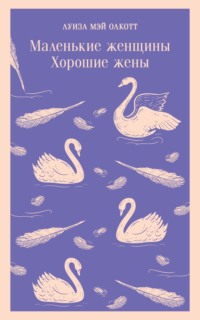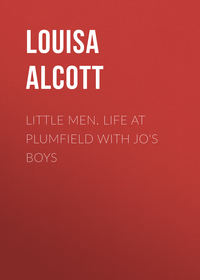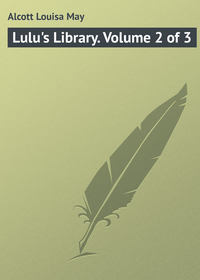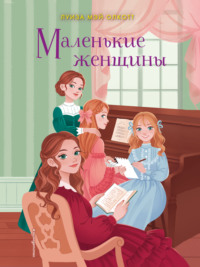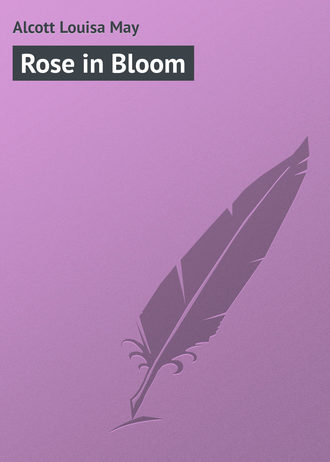 полная версия
полная версияRose in Bloom
Rose obeyed, and neither spoke for a moment, as the old woman held the young one close, and appeased the two years' longing of a motherly heart by the caresses women give the creatures dearest to them. Right in the middle of a kiss, however, she stopped suddenly; and, holding out one arm, caught Phebe, who was trying to steal away unobserved.
"Don't go: there's room for both in my love, though there isn't in my lap. I'm so grateful to get my dear girls safely home again, that I hardly know what I'm about," said Aunt Plenty, embracing Phebe so heartily that she could not feel left out in the cold, and stood there with her black eyes shining through the happiest tears.
"There, now I've had a good hug, and feel as if I was all right again. I wish you'd set that cap in order, Rose: I went to bed in such a hurry I pulled the strings off and left it all in a heap. Phebe, dear, you shall dust round a mite, just as you used to; for I haven't had any one to do it as I like since you've been gone, and it will do me good to see all my knickknacks straightened out in your tidy way," said the elder lady, getting up with a refreshed expression on her rosy old face.
"Shall I dust in here too?" asked Phebe, glancing toward an inner room which used to be her care.
"No, dear, I'd rather do that myself. Go in if you like: nothing is changed. I must go and see to my pudding;" and Aunt Plenty trotted abruptly away, with a quiver of emotion in her voice which made even her last words pathetic.
Pausing on the threshold as if it was a sacred place, the girls looked in with eyes soon dimmed by tender tears; for it seemed as if the gentle occupant was still there. Sunshine shone on the old geraniums by the window; the cushioned chair stood in its accustomed place, with the white wrapper hung across it, and the faded slippers lying ready. Books and basket, knitting and spectacles, were all just as she had left them; and the beautiful tranquillity that always filled the room seemed so natural both lookers turned involuntarily toward the bed where Aunt Peace used to greet them with a smile. There was no sweet old face upon the pillow now, yet the tears that wet the blooming cheeks were not for her who had gone, but for her who was left; because they saw something which spoke eloquently of the love which outlives death and makes the humblest thing beautiful and sacred.
A well-worn footstool stood beside the bed, and in the high-piled whiteness of the empty couch there was a little hollow where a gray head nightly rested, while Aunt Plenty said the prayers her mother taught her seventy years ago.
Without a word, the girls softly shut the door: and, while Phebe put the room in the most exquisite order, Rose retrimmed the plain white cap, where pink and yellow ribbons never rustled now; both feeling honored by their tasks, and better for their knowledge of the faithful love and piety which sanctified a good old woman's life.
"You darling creature, I'm so glad to get you back! I know it's shamefully early; but I really couldn't keep away another minute. Let me help you: I'm dying to see all your splendid things; for I saw the trunks pass, and I know you've quantities of treasures," cried Annabel Bliss, all in one breath as she embraced Rose an hour later, and glanced about the room bestrewn with a variety of agreeable objects.
"How well you are looking! Sit down and I'll show you my lovely photographs. Uncle chose all the best for me, and it's a treat to see them," answered Rose, putting a roll on the table and looking about for more.
"Oh, thanks! I haven't time now: one needs hours to study such things. Show me your Paris dresses, there's a dear: I'm perfectly aching to see the last styles," and Annabel cast a hungry eye toward certain large boxes delightfully suggestive of French finery.
"I haven't got any," said Rose, fondly surveying the fine photographs as she laid them away.
"Rose Campbell! you don't mean to say that you didn't get one Paris dress at least?" cried Annabel, scandalized at the bare idea of such neglect.
"Not one for myself: Aunt Clara ordered several, and will be charmed to show them when her box comes."
"Such a chance! right there and plenty of money! How could you love your uncle after such cruelty?" sighed Annabel, with a face full of sympathy.
Rose looked puzzled for a minute, then seemed to understand, and assumed a superior air which became her very well, as she said, good-naturedly opening a box of laces, "Uncle did not forbid my doing it, and I had money enough; but I chose not to spend it on things of that sort."
"Could and didn't! I can't believe it!" And Annabel sunk into a chair, as if the thought was too much for her.
"I did rather want to at first, just for the fun of the thing; in fact, I went and looked at some amazing gowns. But they were very expensive, very much trimmed, and not my style at all; so I gave them up, and kept what I valued more than all the gowns Worth ever made."
"What in the world was it?" cried Annabel, hoping she would say diamonds.
"Uncle's good opinion," answered Rose, looking thoughtfully into the depths of a packing case, where lay the lovely picture that would always remind her of the little triumph over girlish vanity, which not only kept but increased "Uncle's good opinion."
"Oh, indeed!" said Annabel, blankly, and fell to examining Aunt Plenty's lace; while Rose went on with a happy smile in her eyes as she dived into another trunk.
"Uncle thinks one has no right to waste money on such things; but he is very generous, and loves to give useful, beautiful, or curious gifts. See, all these pretty ornaments are for presents; and you shall choose first whatever you like."
"He's a perfect dear!" cried Annabel, revelling in the crystal, filigree, coral, and mosaic trinkets spread before her; while Rose completed her rapture by adding sundry tasteful trifles fresh from Paris.
"Now tell me, when do you mean to have your coming-out party? I ask because I've nothing ready, and want plenty of time; for, I suppose, it will be the event of the season," asked Annabel, a few minutes later, as she wavered between a pink coral and a blue lava set.
"I came out when I went to Europe; but I suppose Aunty Plen will want to have some sort of merrymaking to celebrate our return. I shall begin as I mean to go on, and have a simple, sociable sort of party, and invite every one whom I like, no matter in what 'set' they happen to belong. No one shall ever say I am aristocratic and exclusive: so prepare yourself to be shocked; for old friends and young, rich and poor, will be asked to all my parties."
"Oh, my heart! you are going to be odd just as mamma predicted!" sighed Annabel, clasping her hands in despair, and studying the effect of three bracelets on her chubby arm in the midst of her woe.
"In my own house I'm going to do as I think best; and, if people call me odd, I can't help it. I shall endeavor not to do any thing very dreadful; but I seem to inherit uncle's love for experiments, and mean to try some. I dare say they will fail and I shall get laughed at; I intend to do it nevertheless, so you had better drop me now before I begin," said Rose, with an air of resolution that was rather alarming.
"What shall you wear at this new sort of party of yours?" asked Annabel, wisely turning a deaf ear to all delicate or dangerous topics and keeping to matters she understood.
"That white thing over there. It is fresh and pretty, and Phebe has one like it. I never want to dress more than she does; and gowns of that sort are always most appropriate and becoming to girls of our age."
"Phebe! you don't mean to say you are going to make a lady of her!" gasped Annabel, upsetting her treasures, as she fell back with a gesture that made the little chair creak again; for Miss Bliss was as plump as a partridge.
"She is one already, and anybody who slights her slights me; for she is the best girl I know and the dearest," cried Rose, warmly.
"Yes, of course, – I was only surprised, – you are quite right; for she may turn out to be somebody, and then how glad you'll feel that you were so good to her!" said Annabel, veering round at once, seeing which way the wind blew.
Before Rose could speak again, a cheery voice called from the hall, —
"Little mistress, where are you?"
"In my room, Phebe, dear," and up came the girl Rose was going to "make a lady of," looking so like one that Annabel opened her china-blue eyes, and smiled involuntarily as Phebe dropped a little courtesy in playful imitation of her old manner, and said quietly, —
"How do you do, Miss Bliss?"
"Glad to see you back, Miss Moore," answered Annabel, shaking hands in a way that settled the question of Phebe's place in her mind for ever; for the stout damsel had a kind heart in spite of a weak head, and was really fond of Rose. It was evidently, "Love me, love my Phebe;" so she made up her mind on the spot that Phebe was somebody, and that gave an air of romance even to the poor-house.
She could not help staring a little, as she watched the two friends work together, and listened to their happy talk over each new treasure as it came to light; for every look and word plainly showed that years of close companionship had made them very dear to one another. It was pretty to see Rose try to do the hardest part of any little job herself: still prettier to see Phebe circumvent her, and untie the hard knots, fold the stiff papers, or lift the heavy trays with her own strong hands; and prettiest of all to hear her say in a motherly tone, as she put Rose into an easy chair, —
"Now, my deary, sit and rest; for you will have to see company all day, and I can't let you get tired out so early."
"That is no reason why I should let you either. Call Jane to help or I'll bob up again directly," answered Rose, with a very bad assumption of authority.
"Jane may take my place downstairs; but no one shall wait on you here except me, as long as I'm with you," said stately Phebe, stooping to put a hassock under the feet of her little mistress.
"It is very nice and pretty to see; but I don't know what people will say when she goes into society with the rest of us. I do hope Rose won't be very odd," said Annabel to herself as she went away to circulate the depressing news that there was to be no grand ball; and, saddest disappointment of all, that Rose had not a single Paris costume with which to refresh the eyes and rouse the envy of her amiable friends.
"Now I've seen or heard from all the boys but Charlie, and I suppose he is too busy. I wonder what he is about," thought Rose, turning from the hall door, whither she had courteously accompanied her guest.
The wish was granted a moment after; for, going into the parlor to decide where some of her pictures should hang, she saw a pair of boots at one end of the sofa, a tawny-brown head at the other, and discovered that Charlie was busily occupied in doing nothing.
"The voice of the Bliss was heard in the land, so I dodged till she went upstairs, and then took a brief siesta while waiting to pay my respects to the distinguished traveller, Lady Hester Stanhope," he said, leaping up to make his best bow.
"The voice of the sluggard would be a more appropriate quotation, I think. Does Annabel still pine for you?" asked Rose, recalling certain youthful jokes upon the subject of unrequited affections.
"Not a bit of it. Fun has cut me out, and the fair Annabella will be Mrs. Tokio before the winter is over, if I'm not much mistaken."
"What, little Fun See? How droll it seems to think of him grown up and married to Annabel of all people! She never said a word about him; but this accounts for her admiring my pretty Chinese things, and being so interested in Canton."
"Little Fun is a great swell now, and much enamoured of our fat friend, who will take to chopsticks whenever he says the word. I needn't ask how you do, cousin; for you beat that Aurora all hollow in the way of color. I should have been up before, but I thought you'd like a good rest after your voyage."
"I was running a race with Jamie before nine o'clock. What were you doing, young man?"
"'Sleeping I dreamed, love, dreamed, love, of thee,'"began Charlie; but Rose cut him short by saying as reproachfully as she could, while the culprit stood regarding her with placid satisfaction, —
"You ought to have been up and at work like the rest of the boys. I felt like a drone in a hive of very busy bees, when I saw them all hurrying off to their business."
"But, my dear girl, I've got no business. I'm making up my mind, you see, and do the ornamental while I'm deciding. There always ought to be one gentleman in a family, and that seems to be rather my line," answered Charlie, posing for the character, with an assumption of languid elegance which would have been very effective if his twinkling eyes had not spoilt it.
"There are none but gentlemen in our family, I hope," answered Rose, with the proud air she always wore when any thing was said derogatory to the name of Campbell.
"Of course, of course. I should have said gentleman of leisure. You see it is against my principles to slave as Archie does. What's the use? Don't need the money, got plenty; so why not enjoy it, and keep jolly as long as possible? I'm sure cheerful people are public benefactors in this world of woe."
It was not easy to object to this proposition, especially when made by a comely young man, who looked the picture of health and happiness as he sat on the arm of the sofa, smiling at his cousin in the most engaging manner. Rose knew very well that the Epicurean philosophy was not the true one to begin life upon; but it was difficult to reason with Charlie, because he always dodged sober subjects, and was so full of cheery spirits, one hated to lessen the sort of sunshine which certainly is a public benefactor.
"You have such a clever way of putting things that I don't know how to contradict you, though I still think I'm right," she said gravely. "Mac likes to idle as well as you; but he is not going to do it, because he knows it's bad for him to fritter away his time. He is going to study a profession like a wise boy; though he would much prefer to live among his beloved books, or ride his hobbies in peace."
"That's all very well for him, because he doesn't care for society, and may as well be studying medicine as philandering about the woods with his pockets full of musty philosophers and old-fashioned poets," answered Charlie, with a shrug which plainly expressed his opinion of Mac.
"I wonder if musty philosophers, like Socrates and Aristotle, and old-fashioned poets, like Shakspeare and Milton, are not safer company for him to keep than some of the more modern friends you have?" said Rose, remembering Jamie's hints about wild oats; for she could be a little sharp sometimes, and had not lectured "the boys" for so long it seemed unusually pleasant.
But Charlie changed the subject skilfully by exclaiming with an anxious expression, —
"I do believe you are going to be like Aunt Jane; for that's just the way she comes down on me whenever she gets a chance! Don't take her for a model, I beg: she is a good woman, but a mighty disagreeable one, in my humble opinion."
The fear of being disagreeable is a great bugbear to a girl, as this artful young man well knew, and Rose fell into the trap at once; for Aunt Jane was far from being her model, though she could not help respecting her worth.
"Have you given up your painting?" she asked rather abruptly, turning to a gilded Fra Angelico angel which leaned in the sofa corner.
"Sweetest face I ever saw, and very like you about the eyes, isn't it?" said Charlie, who seemed to have a Yankee trick of replying to one question with another.
"I want an answer, not a compliment," and Rose tried to look severe, as she put away the picture more quickly than she took it up.
"Have I given up painting? Oh, no! I daub a little in oils, slop a little in water-colors, sketch now and then, and poke about the studios when the artistic fit comes on."
"How is the music?"
"More flourishing. I don't practise much, but sing a good deal in company. Set up a guitar last summer, and went troubadouring round in great style. The girls like it, and it's jolly among the fellows."
"Are you studying any thing?"
"Well, I have some law books on my table, – good, big, wise-looking chaps, – and I take a turn at them semi-occasionally, when pleasure palls or parents chide. But I doubt if I do more than learn what 'a allybi' is this year," and a sly laugh in Charlie's eye suggested that he sometimes availed himself of this bit of legal knowledge.
"What do you do then?"
"Fair catechist, I enjoy myself. Private theatricals have been the rage of late, and I have won such laurels that I seriously think of adopting the stage as my profession."
"Really!" cried Rose, alarmed.
"Why not? if I must go to work, isn't that as good as any thing?"
"Not without more talent than I think you possess. With genius one can do any thing: without it one had better let the stage alone."
"There's a quencher for the 'star of the goodlie companie' to which I belong. Mac hasn't a ray of genius for any thing, yet you admire him for trying to be an M.D.," cried Charlie, rather nettled by her words.
"It is respectable, at all events; and I'd rather be a second-rate doctor than a second-rate actor. But I know you don't mean it, and only say so to frighten me."
"Exactly. I always bring it up when any one begins to lecture, and it works wonders. Uncle Mac turns pale, the aunts hold up their hands in holy horror, and a general panic ensues. Then I magnanimously promise not to disgrace the family; and in the first burst of gratitude the dear souls agree to every thing I ask; so peace is restored, and I go on my way rejoicing."
"Just the way you used to threaten to run off to sea, if your mother objected to any of your whims. You are not changed in that respect, though you are in others. You had great plans and projects once, Charlie; and now you seem to be contented with being a 'jack of all trades and master of none.'"
"Boyish nonsense! Time has brought wisdom; and I don't see the sense of tying myself down to one particular thing, and grinding away at it year after year. People of one idea get so deucedly narrow and tame, I've no patience with them. Culture is the thing; and the sort one gets by ranging over a wide field is the easiest to acquire, the handiest to have, and the most successful in the end. At any rate, it is the kind I like, and the only kind I intend to bother myself about."
With this declaration, Charlie smoothed his brow, clasped his hands over his head, and, leaning back, gently warbled the chorus of a college song, as if it expressed his views of life better than he could: —
"While our rosy fillets shedBlushes o'er each fervid head,With many a cup and many a smileThe festal moments we beguile.""Some of my saints here were people of one idea; and, though they were not very successful in a worldly point of view while alive, they were loved and canonized when dead," said Rose, who had been turning over a pile of photographs upon the table, and, just then, found her favorite, St. Francis, among them.
"This is more to my taste. Those worn-out, cadaverous fellows give me the blues; but here's a gentlemanly saint, who takes things easy, and does good as he goes along, without howling over his own sins, or making other people miserable by telling them of theirs." And Charlie laid a handsome St. Martin beside the brown-frocked monk.
Rose looked at both, and understood why her cousin preferred the soldierly figure with the sword to the ascetic with his crucifix. One was riding bravely through the world in purple and fine linen, with horse and hound, and squires at his back; the other was in a lazar-house, praying over the dead and dying. The contrast was a strong one; and the girl's eyes lingered longest on the knight, though she said thoughtfully, —
"Yours is certainly the pleasantest: and yet I never heard of any good deed he did, except divide his cloak with a beggar; while my St. Francis gave himself to charity just when life was most tempting, and spent years working for God without reward. He's old and poor, and in a dreadful place, but I won't give him up; and you may have your gay St. Martin, if you want him."
"No, thank you; saints are not in my line: but I'd like the golden-haired angel in the blue gown, if you'll let me have her. She shall be my little Madonna, and I'll pray to her like a good Catholic," answered Charlie, turning to the delicate, deep-eyed figure, with the lilies in its hand.
"With all my heart, and any others that you like. Choose some for your mother, and give them to her with my love."
So Charlie sat down beside Rose to turn and talk over the pictures for a long and pleasant hour. But when they went away to lunch, if there had been any one to observe so small but significant a trifle, good St. Francis lay face downward behind the sofa, while gallant St. Martin stood erect upon the chimney-piece.
CHAPTER III.
MISS CAMPBELL
While the travellers unpack their trunks, we will pick up, as briefly as possible, the dropped stitches in the little romance we are weaving.
Rose's life had been a very busy and quiet one for the four years following the May-day when she made her choice. Study, exercise, house-work, and many wholesome pleasures, kept her a happy, hearty creature, yearly growing in womanly graces, yet always preserving the innocent freshness girls lose so soon when too early sent upon the world's stage, and given a part to play.
Not a remarkably gifted girl in any way, and far from perfect; full of all manner of youthful whims and fancies; a little spoiled by much love; rather apt to think all lives as safe and sweet as her own; and, when want or pain appealed to her, the tender heart overflowed with a remorseful charity, which gave of its abundance recklessly. Yet, with all her human imperfections, the upright nature of the child kept her desires climbing toward the just and pure and true, as flowers struggle to the light; and the woman's soul was budding beautifully under the green leaves behind the little thorns.
At seventeen, Dr. Alec pronounced her ready for the voyage round the world, which he considered a better finishing off than any school could give her. But just then Aunt Peace began to fail, and soon slipped quietly away to rejoin the lover she had waited for so long. Youth seemed to come back in a mysterious way to touch the dead face with lost loveliness, and all the romance of her past to gather round her memory. Unlike most aged women, her friends were among the young; and, at her funeral, the gray heads gave place to the band of loving girls who made the sweet old maiden ready for her rest, bore her pall, and covered her grave with the white flowers she had never worn.
When this was over, poor Aunt Plenty seemed so lost without her life-long charge that Dr. Alec would not leave her; and Rose gladly paid the debt she owed by the tender service which comforts without words. But Aunt Plenty, having lived for others all her days, soon rebelled against this willing sacrifice, soon found strength in her own sincere piety, solace in cheerful occupation, and amusement in nursing Aunt Myra, who was a capital patient, as she never died and never got well.
So, at last, the moment came when, with free minds, the travellers could set out; and on Rose's eighteenth birthday, with Uncle Alec and the faithful Phebe, she sailed away to see and study the big, beautiful world, which lies ready for us all, if we only know how to use and to enjoy it.
Phebe was set to studying music in the best schools; and, while she trained her lovely voice with happy industry, Rose and her uncle roamed about in the most delightful way, till two years were gone like a dream, and those at home clamored for their return.
Back they came, and now the heiress must make ready to take her place; for at twenty-one she came into possession of the fortune she had been trying to learn how to use well. Great plans fermented in her brain; for, though the heart was as generous as ever, time had taught her prudence, and observation shown her that the wisest charity is that which helps the poor to help themselves.



